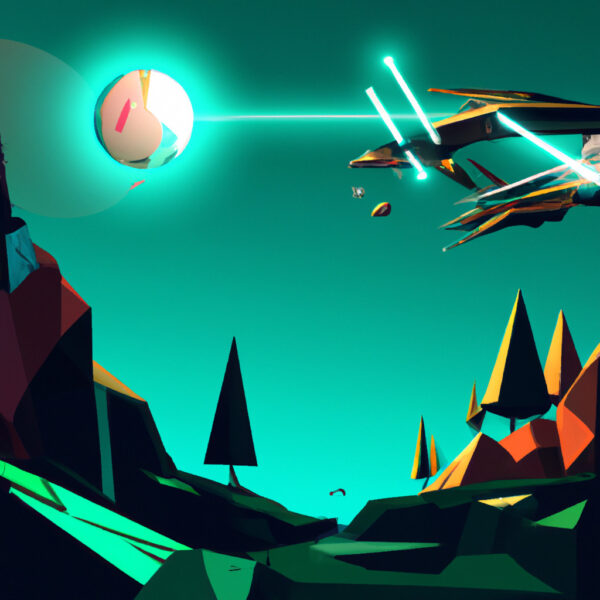Python has emerged as one of the most popular programming languages worldwide. But did you know Python also has a fantastic library that makes creating games accessible and straightforward? Enter Pygame – a library that is shaping how Python programmers approach game development! Whether you’re an experienced developer or a beginner taking your first steps into the world of coding, the practical and fun nature of Pygame allows you to learn and apply Python concepts while harnessing your creativity. So strap in and let’s dive into the world of Pygame!
Table of contents
What is Pygame?
Pygame is a set of Python modules specifically designed for game development. It’s a free and open-source library that offers tools for graphics, sound, and input handling amidst other game-specific features. Whether you’re looking to create a simple 2D game or want to delve into creating 3D games and using object-oriented programming (OOP), Pygame has the resources and capacity to help you develop a full-fledged game.
The versatility and flexibility of Pygame have led to its widespread use and endorsement by Python programmers. Introductory programming courses and Python tutorials often integrate Pygame as a practical means of engaging students with real-world programming environments right from the onset. Despite not being a 3D-focused engine like Unity or Unreal, Pygame provides a foundational and understandable introduction to game development, preparing developers to smoothly transition to larger libraries like libGDX and the LÖVE framework.
Why Learn Pygame?
Learning Pygame can offer numerous benefits regardless of your familiarity with coding or game development. Here are just some reasons why you should consider diving into Pygame:
- Promotes Fun Learning: Pygame provides an interactive and enjoyable way to learn Python. Building different types of games can make the learning process more enjoyable and engaging.
- Enhances Python Skills: Developing games with Pygame encourages you to apply and master your Python programming skills. From implementing loops to creating classes and handling events, Pygame can effectively help you learn and practice Python.
- Rewarding and Tangible Results: Results from learning Pygame are impressive and immediate. You get to create and play your own games, which can be a huge motivator.
- Open Source & Active Community: Pygame offers numerous resources thanks to its open-source nature and active community. You can participate in upcoming game jams like the Pygames hackathon, PyWeek, or Ludum Dare, and get help from other programmers in the community.
Applications of Pygame beyond Game Development
While it’s evident that Pygame is an excellent tool for game creation and teaching Python, its applications extend beyond the gaming realm. Here’s how:
- Promote Graphic Skills: Pygame fosters an understanding of graphic programming. This knowledge can be used to construct and manipulate images, animations, and simulations.
- Multimedia Applications: Pygame supports the creation of multimedia applications. It equips you with the ability to create interactive presentations, build graphic interfaces, and even design screensavers.
- Prototyping: Beyond game creation, Pygame also facilitates quick and easy prototyping of software that requires graphics, sound, and user interaction, making it an invaluable tool for developers.
Learning Pygame, therefore, not only strengthens your foundational knowledge of programming languages but heightens your versatility as a developer. Since the techniques learned can be carried over to other fields, Pygame provides excellent value for the time investment required to learn it.
How to Learn Pygame?
Acknowledging Pygame’s utility in game development and beyond, you might be wondering, “How do I get started?” Here is a general roadmap that can guide your learning journey:
- First Steps in Python: Before diving into Pygame, start by grasping the fundamentals of Python programming language. Having a strong understanding of Python syntax, loops, functions, and classes is key to leveraging the power of Pygame.
- Begin with Pygame: Upon gaining a solid command over Python, start creating games with Pygame. Familiarize yourself with the Pygame documentation and experiment with creating simple games.
- Advance Your Skills: As you get comfortable with creating basic games, gradually increase the complexity of your projects. Test your knowledge and skills by participating in game jams or Hackathons to further deepen your understanding and expand your portfolio.
Learning Python and understanding how to use Pygame to create games can be a challenging task especially if you’re starting from scratch. But with the right resources and a well-structured learning path, you can tackle this journey methodically and effectively.
Our Python Mini-Degree on Zenva Academy offers a comprehensive resource for individuals looking to learn Python and graduate into game development using Pygame. This course, designed considering the needs of beginners, breaks down complex concepts into easy-to-understand modules. We focus on fostering your understanding and application of Python basics before moving onto the more advanced topics such as Pygame.
Furthermore, the course is project-based, allowing you to get hands-on experience and build games even as you learn. After all, applying learned concepts is a key aspect of learning any programming language! By the end of our course, you’ll have created several games that will serve as a testament to your understanding of Python and Pygame, while also boosting your portfolio. Together, let’s embark on this exciting journey of Python and Pygame. The games you create today might inspire the developers of tomorrow!
You can start your journey with us right now by enrolling in our Python Programming Mini-Degree. Happy coding!
Learning Resources
If you’re interested in venturing into the field of Python and game development with Pygame, consider using some of these selected resources to enhance your learning experience and broaden your skills:
Python Programming Mini-Degree
Offered by Zenva Academy, the Python Mini-Degree is a comprehensive collection of courses on Python programming that progresses from the basics of coding to more advanced topics such as algorithms, object-oriented programming, game development, and app development. The courses are designed for both beginners and more experienced learners. This Mini-Degree includes projects such as:
- Creating games
- Developing algorithms
- Building real-world apps
Intro to Pygame
This article provides an overview of Intro to Pygame, a course that teaches how to build games using Python and the Pygame library. The course covers topics like implementing game loops and clocks, adding shapes and colors, managing movement and collisions, and handling user input. The course includes:
- Live coding lessons
- Quizzes for reinforcement
- Hands-on experiences
Intermediate Python – Virtual Pet with Pygame
Zenva Academy offers this intermediate Python course focusing on creating a virtual pet game using the Pygame library. The Intermediate Python – Virtual Pet with Pygame course encourages project management, object creation, handling interactions, and more. The course is accessible for learners of all levels.
Pygame Object-Oriented Tutorial
This guide on the GameDev Academy provides a comprehensive introduction to Pygame Object-Oriented Programming (OOP). This tutorial gives step-by-step instructions on various game development aspects, reinforcing why Pygame OOP is a valuable skill for any game developer.
A Comprehensive Introduction to Pygame
The article dives deep into Pygame basics, teaching learners how to use built-in Sprites and Rects for game functionality.
Python Pygame Tutorial
This tutorial guides the reader through developing games using Python and Pygame, making it an excellent resource for complete beginners.
Pygame 3D Tutorial
This complete guide navigates through the process of creating 3D games with Pygame, introducing key concepts like setting up Pygame and handling keyboard input.
Armed with these useful resources, you’re all set to embark on your Python and Pygame learning journey. The world of game development eagerly awaits your creations!
What is Pygame – Wrap-Up
Learning Python through Pygame is a judicious step toward unleashing your potential in game development and beyond. It doesn’t just bolster your programming skills, but also opens up a multitude of exciting opportunities in multimedia, graphics, and prototype development.
The journey might seem daunting at first glance, but with diligent practice and the right resources, you can master Python and Pygame and bring your game ideas to life. Remember, learning is a continual process, and each step you take puts you closer to your goals. Whether you’re a beginner or a professional seeking to upgrade your Python skills, your journey is yours, unique and full of potential.
Take your first or next step towards mastering Python and Pygame with our Python Mini-Degree on Zenva Academy. This course provides manageable sections designed to give you a strong understanding of Python, paired with the fun and creativity of game development through Pygame. The projects you will work on are not only fun, they offer practical, hands-on experience, ensuring you gain complete mastery over the concepts introduced.
So don’t wait! Embrace the fun and creative world of programming and game development with our Python Mini-Degree. Embark on an exciting journey of learning, creating, and growing with Python and Pygame today.
Did you come across any errors in this tutorial? Please let us know by completing this form and we’ll look into it!

FINAL DAYS: Unlock coding courses in Unity, Godot, Unreal, Python and more.







